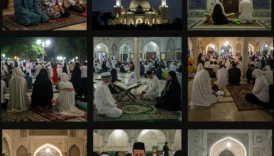What Are The Duties Of Angels?
Angels are pure beings created from light who execute Allah’s commands flawlessly. Their duties span from conveying revelation, recording deeds, managing natural phenomena, to guiding souls, reflecting divine order in the universe.
- What Are The Duties Of Angels?
- Definition And Essence
- The Duty Of Revelation
- Recording Of Deeds
- Distribution Of Sustenance And Natural Order
- The Angel Of Death And The Taking Of Souls
- Role Of Israfil On The Day Of Judgment
- Other Important Duties
- Influence On Human Life
- Quranic And Hadith Evidences
- Common Misconceptions
- Final Words
- References
Definition And Essence
Angels are fundamental to the Islamic faith, constituting one of the six articles of iman (faith). They are created from light, embodying purity and complete obedience to Allah. Unlike humans, angels have no free will and are never prone to sin; they continuously engage in the worship and glorification of their Creator. (Sahih Muslim)
The Duty Of Revelation
One of the most revered responsibilities assigned to angels is the conveyance of divine revelation. The angel Jibril (Gabriel) holds this honored task. He was entrusted with delivering the Quran to Prophet Muhammad (peace be upon him), thereby bridging the divine and human realms. A notable Quranic verse emphasizing this duty is:
قُلْ مَنْ كَانَ عَدُوًّا لِجِبْرِيلَ
Qul man kāna ʿaduwwan lijibrīl
“Say, ‘Whoever is an enemy to Jibril…’”
(Surah Al-Baqarah, 97) (Tafsir Ibn Kathir)
This verse underscores the significance of Jibril’s role as the conduit of Allah’s message, which has shaped the course of Islamic revelation and the lives of believers throughout history.
Recording Of Deeds
Another pivotal duty of angels is the meticulous recording of every human action. Known as the Kiraman Katibin (Noble Scribes), these angels are stationed by each individual—one on the right and one on the left—to document every deed, whether good or bad. The Quran states that nothing escapes their recording, a reminder that accountability is ever-present in a believer’s life. (Sahih al-Bukhari)
This constant surveillance encourages Muslims to uphold honesty, integrity, and righteousness, knowing that every action is recorded and will be accounted for on the Day of Judgment.
Distribution Of Sustenance And Natural Order
Angels are also integral to the administration of natural phenomena and the distribution of sustenance. The angel Mikail (Michael) is renowned for his role in overseeing the forces of nature, including the provision of rain, the growth of vegetation, and the allocation of sustenance among creatures. According to Islamic tradition, these natural processes are not random; they are carefully regulated by the divine will as executed through the angels. (Tafsir Ibn Kathir)
This divine administration reinforces the belief that every element of nature operates under Allah’s command, ensuring a balanced and purposeful order within the universe.
The Angel Of Death And The Taking Of Souls
Azrael, often referred to as the Angel of Death, carries out the solemn duty of separating the soul from the body at the time decreed by Allah. Although the Quran emphasizes that it is ultimately Allah who takes the souls, Azrael is the executor of this divine ordinance. A Quranic verse illustrating this process is:
اللَّهُ يَتَوَفَّى الْأَنْفُسَ حِينَ مَوْتِهَا
Allahu yatwaffa al-anfusa heena mawtiha
“Allah takes the souls at the time of their death.”
(Surah Az-Zumar, 42) (Tafsir Ibn Kathir)
Through this duty, the transition from worldly life to the Hereafter is managed with precision, reinforcing the transient nature of human existence and the perpetual divine oversight.
Role Of Israfil On The Day Of Judgment
Israfil is the angel designated with the critical task of blowing the trumpet on the Day of Judgment. This event signifies both the end of the world and the commencement of resurrection. The blowing of the trumpet, which occurs in two phases, marks the moment when all life ceases, followed by the reawakening of creation for final judgment. (Riyad as-Salihin)
Israfil’s role highlights the dramatic transition from life to the eternal state, emphasizing that the world is transient and that ultimate accountability awaits every soul.
Other Important Duties
Beyond the primary roles mentioned, angels undertake several other significant responsibilities that contribute to the maintenance of divine order:
- Guardian Angels (Hafaza): These angels are tasked with protecting individuals from harm. By Allah’s command, they intervene during times of danger and misfortune, ensuring safety and guidance.
- Angels Of The Grave (Munkar And Nakir): After death, these angels are responsible for questioning the deceased in their grave, testing their faith and deeds as a prelude to the final judgment. (Sahih Muslim)
- Angels Bearing The Throne: Certain angels are entrusted with carrying and glorifying the Throne of Allah, continuously praising Him and reflecting His infinite majesty.
Each of these roles illustrates the comprehensive nature of angelic duties, extending from the minutiae of daily human life to the grand orchestration of cosmic events.
Influence On Human Life
The awareness of angelic duties has a profound impact on the moral and ethical fabric of a believer’s life. When a Muslim acknowledges that every deed is observed and recorded by angels, it fosters a deep sense of accountability and piety. This belief nurtures:
- Personal Discipline: The constant presence of recording angels motivates individuals to avoid sinful actions and pursue righteousness, reinforcing a disciplined, ethical lifestyle.
- Social Responsibility: Understanding that angels witness every interaction encourages Muslims to act with fairness, honesty, and compassion in their personal and professional lives.
- Spiritual Comfort: The knowledge that guardian angels are present to protect and guide brings solace, especially during times of hardship and uncertainty.
Such awareness not only enhances personal spirituality but also contributes to a more just and compassionate society, in line with the teachings of Islam.
Quranic And Hadith Evidences
The duties of angels are well documented in both the Quran and authentic Hadith literature. For example, the Quran frequently emphasizes that angels are entrusted with specific roles that underscore Allah’s ultimate authority. In addition to the earlier cited verses, various Hadiths elaborate on the nature of angelic duties. One narration states that when groups of believers engage in the remembrance of Allah (dhikr), angels surround them, showering them with divine mercy and blessings. (Riyad as-Salihin)
Such evidences reinforce the understanding that angels are active participants in the cosmic and personal realms, guiding, protecting, and ensuring the fulfillment of Allah’s will.
Common Misconceptions
Despite clear scriptural evidence, misconceptions about the duties of angels sometimes arise. One common error is the belief that angels can act independently or possess human-like emotions and desires. However, Islamic teachings assert that angels are entirely devoted to executing Allah’s commands without deviation or personal inclination.
Another misunderstanding involves the physical portrayal of angels. While descriptions in the Quran and Hadith mention wings and other features, these should be understood symbolically to represent their spiritual capacity and ability to transcend the physical realm. Such symbolic language emphasizes their role as intermediaries between the divine and the earthly, rather than providing a literal anatomical depiction. (Sahih al-Bukhari)
Final Words
The duties of angels reflect a meticulously organized divine system that governs both the seen and unseen worlds. From delivering revelation and recording human deeds to administering natural laws and guiding souls, angels are indispensable instruments in the execution of Allah’s will. For a believer, acknowledging these duties is not merely an exercise in doctrine but a profound reminder of divine oversight that permeates every aspect of existence.
By understanding and internalizing the roles of these luminous beings, Muslims are encouraged to live with greater piety, responsibility, and reverence for the Creator. The omnipresence of angels inspires humility and mindfulness, ensuring that every action aligns with the eternal principles of justice, mercy, and obedience. Embracing these truths deepens one’s spiritual journey, fostering a closer relationship with Allah and a more harmonious interaction within the community.
References
- Sahih al-Bukhari
- Sahih Muslim
- Tafsir Ibn Kathir
- Riyad as-Salihin
- Classical Islamic Texts
- Al-Ghazali, The Revival of the Religious Sciences
Views: 0





